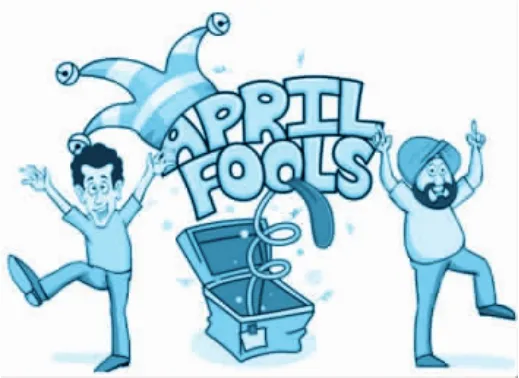April Fool's Day
2018-08-27byJaime姜仲华
by Jaime/姜仲华(译)
□语篇导读
众所周知,愚人节是西方的一个传统节日。这一天,人们可以随心所欲地玩恶作剧,以此给大家带来欢乐。可是你知道愚人节发源于哪里吗?它的发展过程是怎样的呢?历史中的愚人节是否有过什么离奇的故事?不同国家的人们又都是怎样度过愚人节的呢?

April Fool's Day is traditionally a day to play practical jokes on others.No one knows how this holiday began but it was thought to have started in France.
The closest point in time,as the beginning of this tradition,was in 1582,in France.New Year's Day was celebrated on March 25 and celebrations lasted until April 1.When New Year's Day was changed from March 25 to January 1 in the mid-1560's by King Charles IX,there were some people who still celebrated it on April 1 and those people were called April Fools.
Tricks are played on April Fool's Day,such as saying,“Your shoe's untied!”Setting a roommate's alarm clock back an hour is a common trick.And even a British short film once shown on April Fool's Day was about how“spaghetti farmers”harvest their crop from the spaghetti trees.Whatever the trick,the trickster(耍诡计的人)usually ends it by shouting to his victim,“April Fool! ”
April Fool's Day is a“for-fun-only”observance(惯例).Nobody is expected to buy gifts or to take their friends or relatives out to eat in a restaurant.Nobody gets off work or school on this holiday.It's simply a little fun holiday,but a holiday on which one must remain forever vigilant,for he may be the next April Fool!
Each country celebrates April Fool's differently.In France,the April Fool is called“April Fish”.The French fool their friends by taping a paper fish to their friends'backs and when someone discovers a this-trick,they shout,“April Fish”.In England,tricks can be played only in the morning.If a trick is played on you,you are a“noodle”.In Scotland,you are called an“April Gowk”,which is another name for a cuckoo bird.
◆词语积淀
practical/'præktIkl/adj.实际的;实用的;事实上的
untied/ʌn'taId/adj.解开的;松开的
harvest/'hʌvIst/vt.收获;收割
victim/'vIktIm/n.受骗者;上当的人;牺牲
vigilant/'vIdʒIlənt/adj. 警戒的;警惕的
noodle/'nuːdl/n.傻子;笨蛋;傻瓜
◆典句赏析
1....but it was thought to have started in France.……可是人们认为它起源于法国。
was thought为一般过去时的被动语态形式,该句相当于“It was thought that it had started in France.”;to have started为动词不定式的完成体,表示动作先于句子谓语动作发生。
【即时尝试】据报道外星人在地球成功着落。
2....,there were some people who still celebrated it on April 1 and those people were called April Fools.……,有一些人仍然在4月1日庆祝新年,这些人被称作愚人。
who为关系代词,用来引导定语从句,修饰先行词people。句中的who既指代指人的先行词又作从句的主语,一般可以用关系代词that来替换;April Fools是主语those people的补足语。
【即时尝试】在4月1日,被人愚弄的人常被呼作“笨蛋”。
3.Whatever the trick,the trickster(耍诡计的人)usually ends it by shouting to his victim,“April Fool! ”无论这些恶作剧怎样闹腾,恶作剧结束时人们通常都要对上当的人大叫一声“愚人!”。
Whatever the trick是Whatever引导的让步状语从句,后面省略了is或may be(该句型中be动词作谓语时常省略);by doing sth.是固定搭配,表示“通过做某事的方式”。
【即时尝试】无论题目怎样,她都会认真思考解答。
译文助读
传统上,愚人节当天人们一般互开玩笑取乐。没有人知道这个节日是怎么开始的,但是人们普遍认为它起源于法国。
愚人节这一传统最早可以追溯到1582年的法国。那时人们从3月25日起开始庆祝新年,庆祝活动通常要持续到4月1日结束。在16世纪60年代中期,国王查理九世下令将新年从3月25日更改为1月1日,可是此后还有一些人仍然在4月1日庆祝新年,这些人被称作愚人。
愚人节当天会上演各式各样的恶作剧,诸如说,“你的鞋带松开了”。把室友的闹钟拨慢1小时就是常见的恶作剧。甚至曾经在愚人节当天放映的一个英国短片,就是介绍“意大利面条农民”是如何从意大利面条树上收获庄稼的。无论这些恶作剧怎样闹腾,恶作剧结束时人们通常都要对上当的人大叫一声“愚人”。
愚人节一直只是个“玩乐”的节日。人们不指望会有谁买礼物或带亲戚、朋友一起去饭店吃饭。在这个节日没有人不上班或不上课。这只是一个有趣的小节日,可是就在这一天你要时刻保持警觉,说不定你就会是下一个“愚人”。
不同的国家庆祝愚人节的方式不同。在法国,愚人节被称作“April Fish”。法国人愚弄他们的朋友,就在他们的后背粘贴上一个纸做的鱼,当有人发现谁被耍了,就对他大喊一声“愚人”。在英格兰,只能在上午玩恶作剧。如果你被别人玩了一个恶作剧,那么你就是一个“傻瓜”。在苏格兰,你被叫作“April Gowk”,这是布谷鸟的另一个名字。
